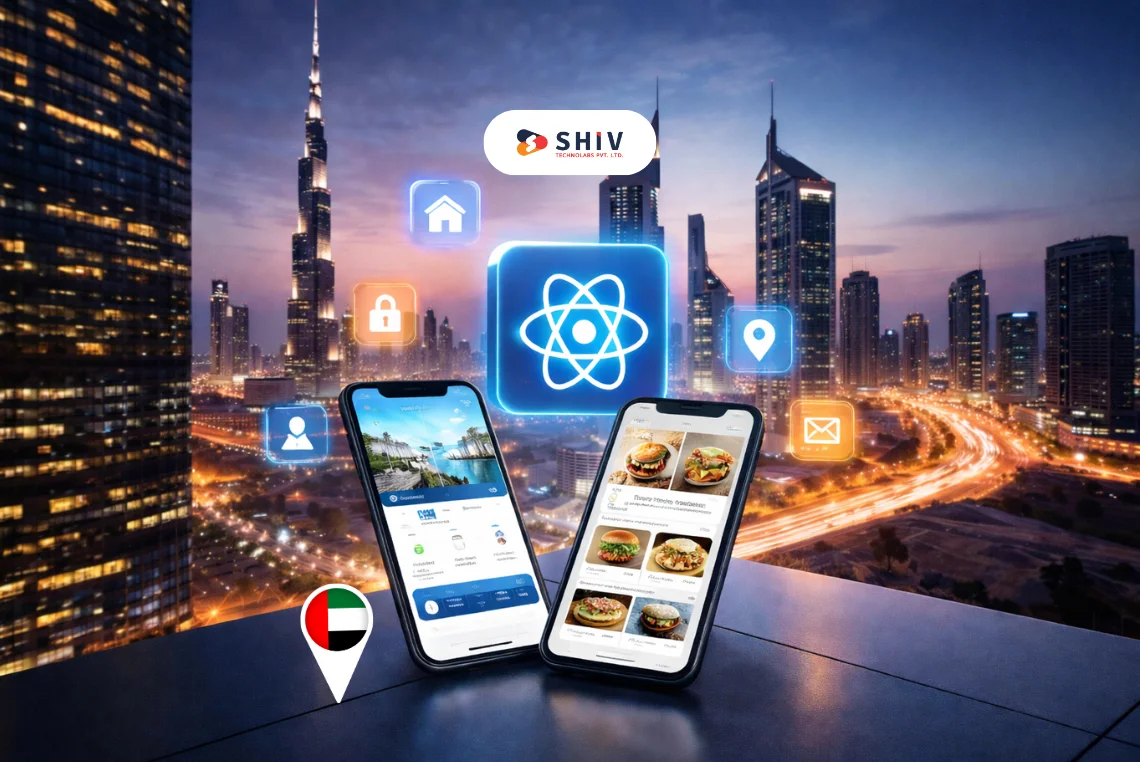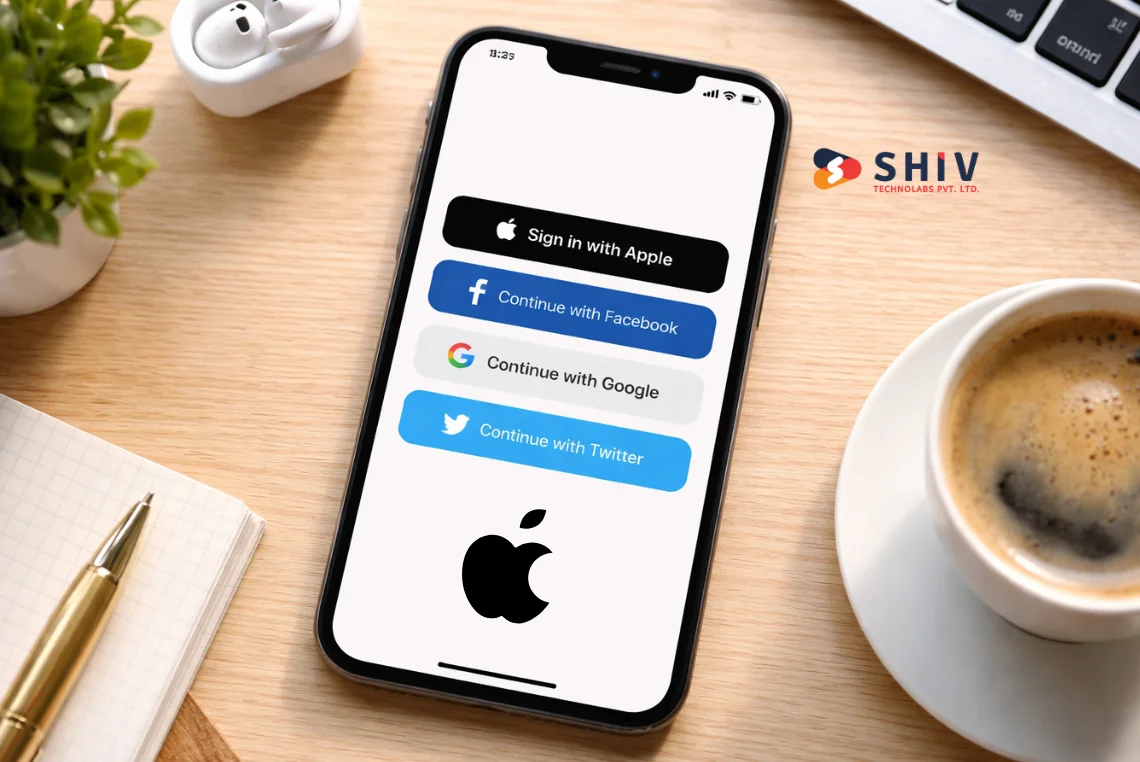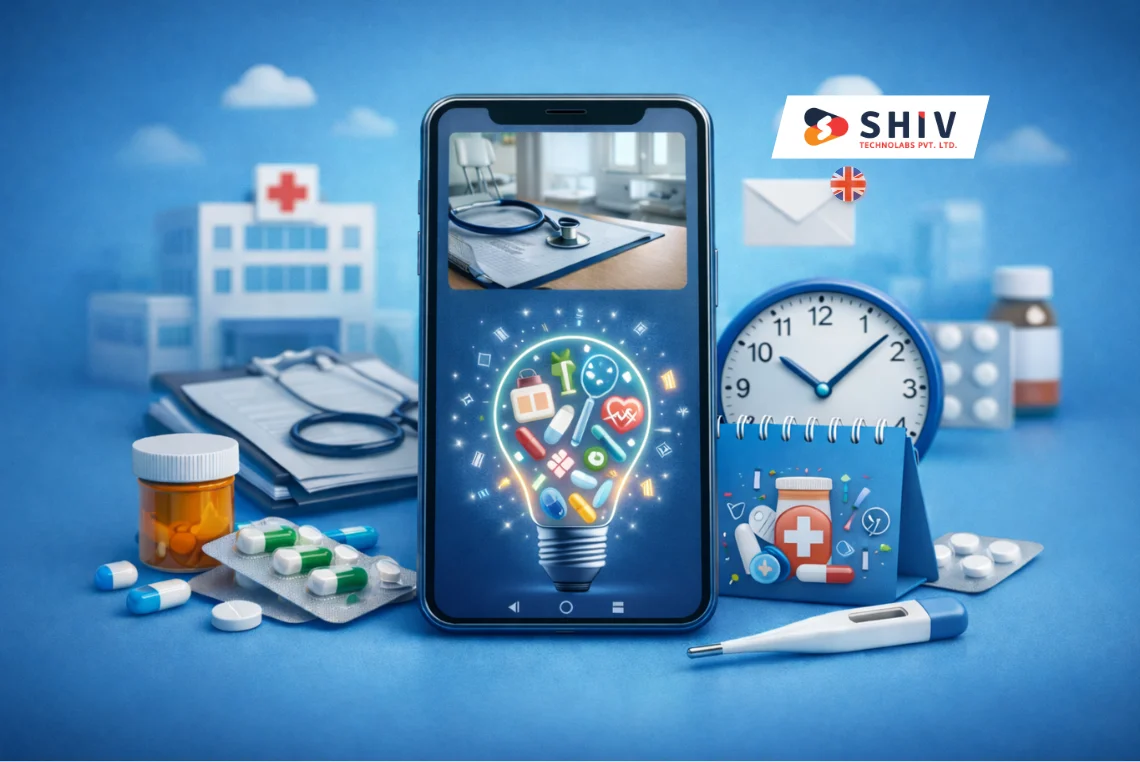Table of Contents
Mobile apps will be the backbone for businesses to connect with users, generate sales, and improve customer experience in 2025. With the rising demand for advanced features and seamless user experiences, selecting the right mobile app development tools is more important than ever.
This guide will look into the best tools for mobile app development in 2025, which will help businesses create high-quality, successful apps.
Top Mobile App Development Trends to Watch in 2025
With mobile app development ever-evolving, staying ahead of emerging trends is important to be successful in 2025. Here are the top trends to watch:
1. Cross-Platform Development Becomes Standard
Cross-platform frameworks by Flutter, React Native, and Xamarin will rule 2025. These all allow developers to construct an application that works well in iOS, Android, or the web, thus saving precious time and other resources while reaching a broader audience.
2. AI and Machine Learning Take Center Stage
AI and ML are revolutionizing mobile applications by providing personalized experiences, smarter recommendations, and enhanced functionality. More apps will be integrating these technologies to provide better user interaction in the form of predictive features and intelligent data analysis.
3. AR/VR: Immersive User Experiences
Augmented Reality and Virtual Reality are set to redefine user engagement in 2025. From virtual shopping experiences to immersive healthcare simulations, expect these technologies to become more mainstream providing users with innovative and interactive experiences through apps.
4. Sustainability and Ethics in Development
Sustainability and ethical practices will play a great deal in the development of apps. The developers will focus on energy-efficient coding and data privacy because of the increasing demand for ethical, eco-friendly products and services from consumers.
5. Prioritize Performance and Security
App performance and security will remain top priorities. As apps become more complex, optimizing speed and responsiveness is critical. Additionally, robust security measures will be necessary to protect user data, making apps both fast and secure.
Also Read: How To Develop A Successful Mobile App?
Top Mobile App Development Tools to Watch in 2025
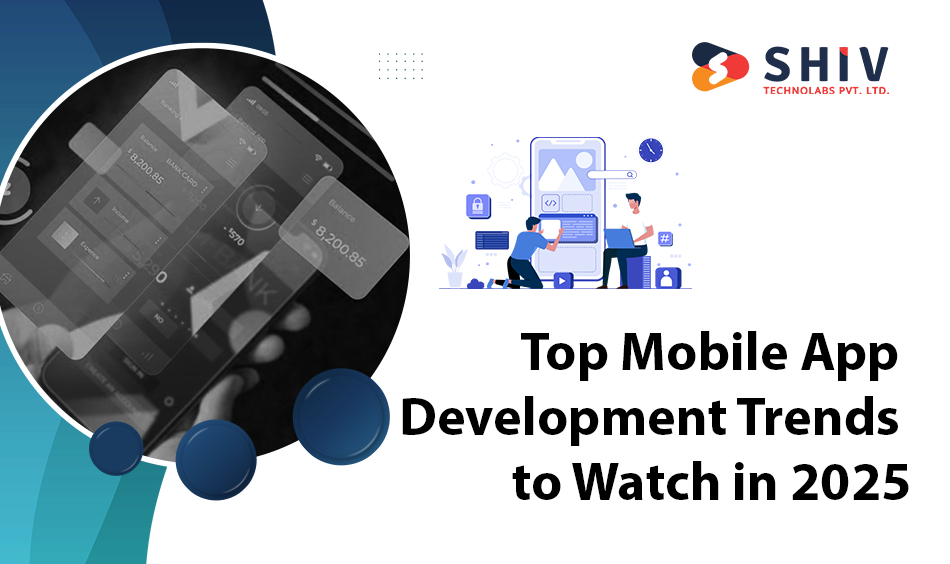
As mobile app development evolves, the right tools play a crucial role in building high-quality, user-friendly applications. In 2025, several powerful tools will help streamline the development process and enhance app performance. Here are the must-have tools for your next project.
1. Development Frameworks for Cross-Platform Success
Development frameworks form the crux of mobile apps, providing the developer with the ability to develop cross-platform solutions based on a single codebase. The demand for cross-platform development tools will continue to rise so that developers can write a single codebase that works across multiple platforms, including iOS, Android, and the web.
# Flutter
Flutter is the leader of the development landscape for being able to produce high-quality, natively compiled applications from a single codebase. It is famous for its rich UI and fast development cycle, hence it remains a top favorite among developers looking to build an app for both iOS and Android efficiently.
# React Native
React Native, developed by Facebook is another popular framework that supports developers in building high-performing cross-platform apps directly in JavaScript with access to native components, thus maximizing app efficiency.
Also Read: Flutter vs. React Native: The Top Choice for App Development
# Xamarin
Xamarin enables native mobile applications at an enterprise level with shared codebases for iOS, Android, as well as Windows. Generally, it’s more desirable for bigger projects that ought to scale more efficiently.
2. Essential Programming Languages
Programming languages form the backbone of mobile application development. The type of language chosen directly influences the performance, scalability, and user experience of an application.
# Swift
Swift remains the number one choice for iOS development. Swift is characterized by its simplicity and speed. It is highly significant for building high-performance apps on the Apple ecosystem.
# Kotlin
It’s the official language for Android development, and Kotlin continues to be the first choice for most. Its concise syntax and full interoperability with Java make it a good framework for developing modern Android apps.
# JavaScript
JavaScript is still a versatile language, suitable for hybrid and PWAs. It is great for mobile web development as it works across all platforms and integrates well with frameworks like React Native.
3. UI/UX Design Tools for Great User Experiencesv
User experience and interface design will remain key aspects of app success. These are some of the tools, below, that developers use to create visually appealing, intuitive app designs.
# Figma
A cross-platform, collaborative tool built in the cloud to run in real time; using Figma can let whole teams work directly on live wireframes and prototypes on design systems or large-scale design plans and share instant suggestions.
# Adobe XD
Adobe XD is an all-in-one design tool that simplifies complex designs. It is perfect for creating interactive prototypes and has seamless integration with the Adobe Creative Cloud.
# Sketch
Sketch remains one of the favorites for UI/UX design, especially for vector-based designs and collaborating with other design tools. Its simplicity and mobile-first design make it suitable for app development.
Also Read: Top 10 Key Elements for Effective UI/UX Design in Mobile Apps
4. Testing and Debugging Tools for Quality Assurance
Testing and debugging are the most crucial stages in mobile app development, which ensures that apps run smoothly and deliver a flawless user experience. The tools below offer solutions for automated and manual testing.
# Appium
Appium is one of the leading tools for automated mobile app testing. It supports native and hybrid applications. It is cross-platform testing, which gives developers greater flexibility and efficiency.
# TestComplete
This is a versatile testing tool that supports both automated and manual testing for mobile apps. Its user-friendly interface and powerful scripting capabilities make it a popular choice for comprehensive app testing.
# Postman
Postman is one of the top tools for testing APIs. Apps rely heavily on APIs to communicate with backend services, and Postman ensures these connections are working flawlessly, enabling faster bug identification and resolution.
5. Project Management Tools for Efficient Collaboration
Efficient project management is crucial for timely app delivery. Tools designed to promote collaboration, track progress, and manage tasks help organize the development process.
# Jira
Jira, from Atlassian, is a highly advanced project management tool, especially among agile teams. Sprint planning, bug tracking, and reporting are some of its key features that ensure smooth sailing in mobile app projects from the beginning to the end.
# Asana
Asana allows for an intuitive interface with which to manage tasks and workflows, making it easier for teams to track their progress toward meeting deadlines. It can be customized for use with small and large teams.
# Trello
Trello remains a top choice for smaller teams or simpler projects. It is visually based on boards and facilitates easy prioritization of tasks, deadline setting, and progress tracking for teams.
The right tools are crucial for developing mobile applications in 2025. Whether it’s building a cross-platform application, designing a seamless user experience, or testing an application for performance, the above list of tools will be crucial to the development process of making the app a more quality-driven and successful application. It ensures that the app delivers its message to the users as well as to the businesses in this arena.
Essential Factors to Consider When Choosing Mobile App Development Tools
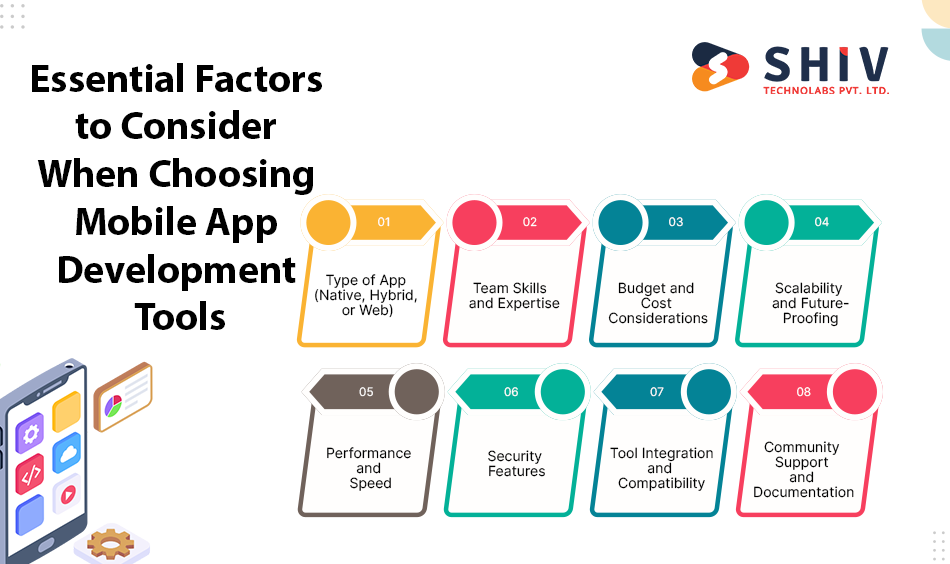
Choosing the right mobile app development tools is one of the key factors in creating a quality application. Here are some critical factors to consider in choosing your 2025 option:
1. Type of App (Native, Hybrid, or Web)
The type of app influences your tool selection:
- Native Apps: Use Swift (iOS) or Kotlin (Android).
- Hybrid Apps: React Native or Flutter works well for cross-platform development.
- Web Apps: JavaScript and frameworks like Angular or Vue.js are ideal for PWAs.
2. Team Skills and Expertise
Choose tools that align with your team’s current skills. Using tools your team is familiar with can accelerate development and minimize errors.
3. Budget and Cost Considerations
Consider both upfront costs and long-term value. Free tools like Flutter and React Native are great, but some paid tools may offer advanced features or premium support that justify the investment.
4. Scalability and Future-Proofing
Select tools that can grow with your app. Ensure they can handle increased traffic and new features as your app evolves.
5. Performance and Speed
Performance is critical to user satisfaction. Native tools typically offer the best performance, but hybrid tools like Flutter and React Native are increasingly efficient.
6. Security Features
Choose tools that support strong security measures like data encryption and GDPR compliance, especially if your app handles sensitive information.
7. Tool Integration and Compatibility
Ensure your selected tools integrate seamlessly with other tools in your stack, such as design, testing, and project management platforms.
8. Community Support and Documentation
A strong community and detailed documentation are invaluable for troubleshooting and efficient development. Look for tools that have an active community and are easy to follow in their resources.
Selecting the appropriate mobile app development tool in 2025 would involve looking into the following factors: app type, team skills, budget, scalability, performance, and security. Using these considerations can make better-informed decisions that will bring you to a more successful and scalable app.
Also Read: How to Optimize Mobile Apps for Better Performance
The Future of Mobile App Development Tools: What to Expect in 2025 and Beyond
The mobile app development landscape is changing rapidly. In 2025 and beyond, new tools and technologies will significantly shape how apps are built and delivered. Here are the key predictions for the future of mobile app development tools
1. AI-Powered Development Tools
AI will play a major role in app development, automating tasks such as coding, debugging, and testing. In the years ahead, developers will become increasingly dependent on AI tools to increase speed and incorporate advanced features such as machine learning models and predictive analytics into apps, thereby providing improved user experiences and performance.
2. Rise of Low-Code/No-Code Platforms
Low-code and no-code platform adoption will become pervasive by 2025, allowing non-technical workers to build applications with GUIs. While they’re not a replacement for all coding, these platforms will allow an organization to develop apps as fast as possible, reducing the need for specialty developers altogether and accelerating development cycles.
3. 5G-Driven Performance Boosts
The adoption of 5G networks will drastically improve app performance, enabling faster data transmission, real-time updates, and enhanced streaming capabilities. App development tools will evolve to leverage the benefits of 5G, ensuring that apps can handle larger data sets and provide smoother user experiences.
4. Cloud-Based Development Tools
Cloud-based tools will continue growing, which can provide scalable environments for mobile app development. Collaboration with cloud solutions, storage and sharing of resources, and deployment of apps at faster rates make cloud platforms crucial for future app development.
As mobile app development, tools evolve with AI, low-code platforms, 5G capabilities, and cloud technologies defining the future, developers, and businesses need to be ahead of these trends to remain in competition and fulfill the demands of modern app users.
Why Shiv Technolabs is Your Ideal Mobile App Development Partner
Shiv Technolabs is proud to be a leading mobile app development company, delivering more than 500 apps to businesses from various industries. Our specialization lies in native mobile app development for Android and iOS as well as cross-platform solutions with advanced frameworks like Flutter and React Native.
Whether you want to build an MVP to test your idea or a customized application according to your needs, we provide end-to-end mobile app development. Our experts make sure that every project is built with precision, focus on the delivery of user-friendly, scalable, and high-performance applications, and give you a personal touch.
Conclusion
Choosing the appropriate mobile application development tools for your project will be a major determinant of success. Ensure your application stands out in 2025 by choosing the appropriate frameworks, languages, design tools, and testing platforms. Consider the trends and technologies that are shaping the industry and evaluate tools based on your app’s specific needs.
Shiv Technolabs brings life to your idea of building an app. The organization is committed to quality innovation and helps make your vision a reality by offering fully customized mobile app development solutions for you. Contact us today to let the fastest growth of business with the best in mobile app development.



